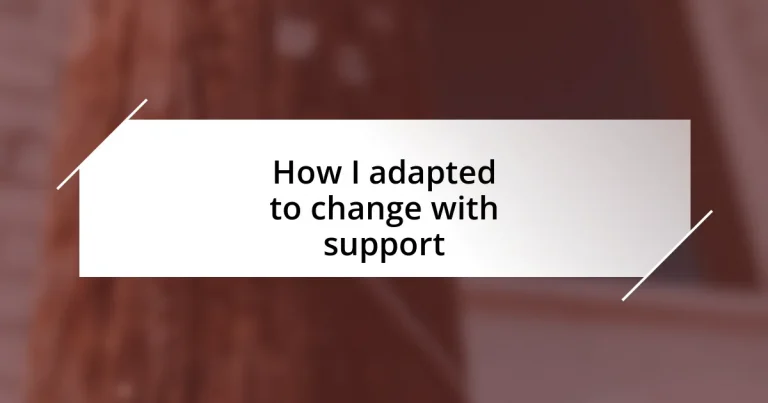Key takeaways:
- Change is an opportunity for growth that can evoke mixed emotions, highlighting the importance of internal responses to external transitions.
- Recognizing the need for support is crucial; sharing burdens with others can lead to transformative experiences and provide new perspectives on challenges.
- Building a support network intentionally enhances resilience, as engaging with diverse relationships fosters a sense of belonging and shared experiences.
- Adapting to change involves mindfulness, setting manageable goals, maintaining an open mindset, and recognizing both progress and setbacks as integral to growth.
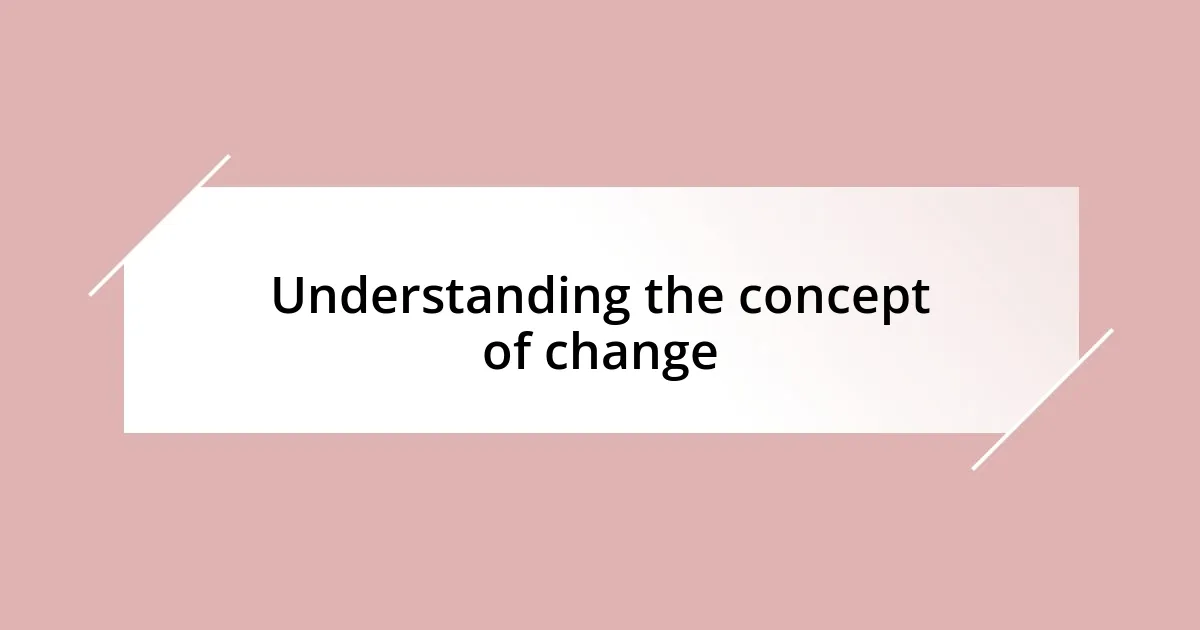
Understanding the concept of change
Change is an inherent part of life, often thrust upon us in unexpected ways. I remember when I first faced a sudden job relocation; it felt like a whirlwind upending my carefully crafted routine. Have you ever felt that overwhelming sense of uncertainty that comes with major transitions?
When I think about change, I realize it’s not just an external event; it’s our internal response that shapes our experience. For me, grappling with the emotions of leaving familiar surroundings stirred up a mix of excitement and anxiety. How do you handle those conflicting feelings when life pushes you in a new direction?
Understanding change also involves recognizing that it presents opportunities for growth. I learned to embrace the unknown, viewing it as a chance to discover new strengths within myself. Isn’t it empowering to think that every shift can lead to greater resilience and adaptability?
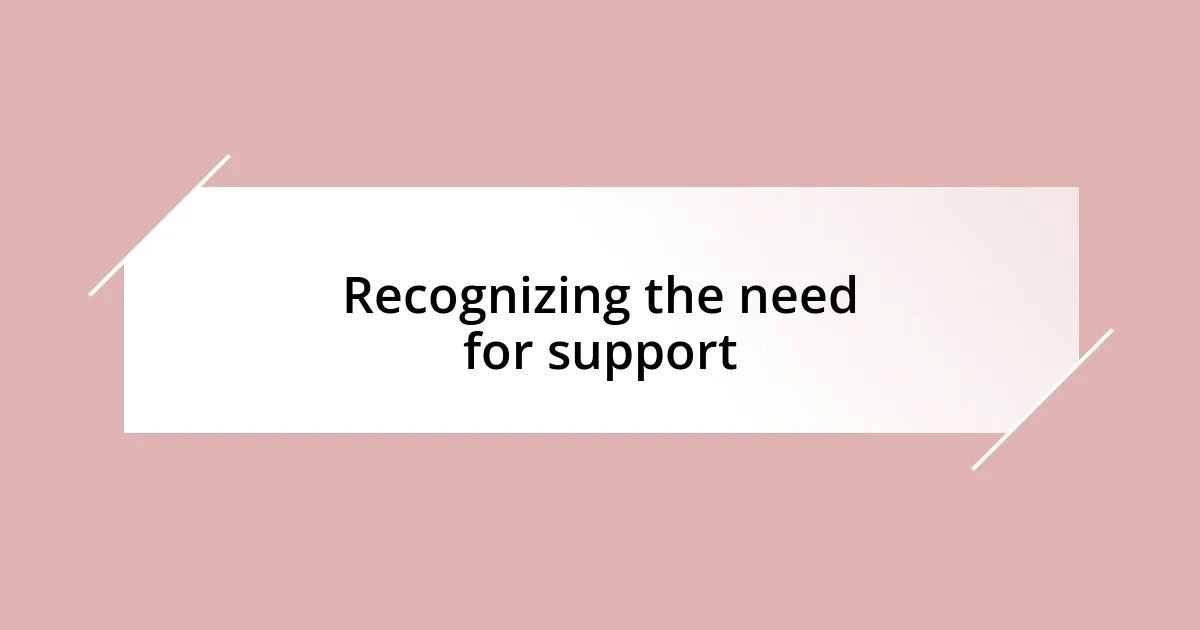
Recognizing the need for support
Recognizing the need for support starts with an awareness of our emotional state during times of upheaval. I distinctly remember feeling frozen when my friend moved away; it was as if I was stuck in quicksand, unable to make a single decision. Have you ever experienced that feeling where you realize you can’t tackle everything alone? It’s a sign that reaching out for support can be the vital first step.
As I navigated through such transitions, I grew more attuned to my feelings of isolation. One time, I found myself staring blankly at an empty calendar, overwhelmed by the tasks ahead, and I knew I needed help. Acknowledging this need is crucial—it allows us to connect with others who can lend their strength and wisdom during our struggles. Isn’t it interesting how sharing our burden can lighten the load?
The moment I recognized my need for support transformed my perspective on change. Seeking help from trusted friends and mentors felt like stepping into a warm light after a prolonged darkness. Their encouragement not only provided comfort but also inspired me to take proactive steps forward. Have you considered how much easier it might be to face challenges when you’re not trying to do it all by yourself?
| Recognizing Signs | Seeking Support |
|---|---|
| Feeling overwhelmed by change | Reaching out to friends or family |
| Experiencing loneliness | Joining support groups or communities |
| Struggling with decisions | Consulting mentors or counselors |
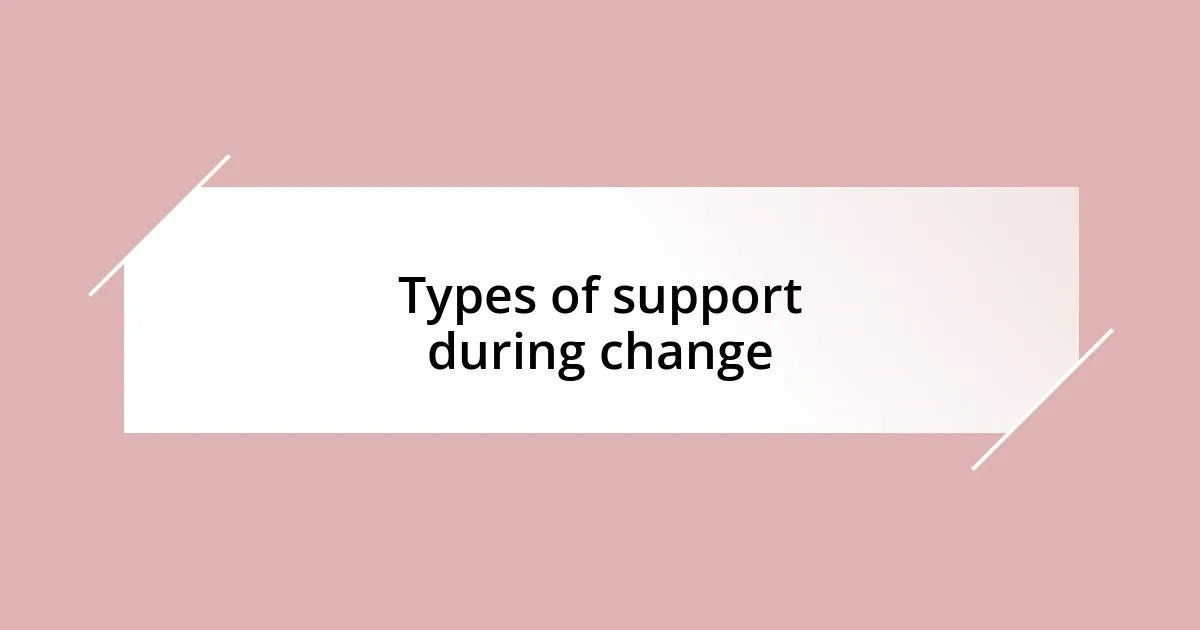
Types of support during change
When navigating change, it’s essential to identify the types of support that can help steer us through uncertain waters. I often think back to moments when I turned to various support systems for guidance, each playing a distinct role in my journey. Friends became my sounding board, family offered emotional grounding, and professional networks provided practical insights. It’s interesting how different sources of support can cater to unique needs during times of change.
Here’s a breakdown of the types of support that can be crucial:
- Emotional Support: Friends and family who listen without judgment, offering comfort and understanding.
- Practical Support: Colleagues or mentors who provide advice or resources to manage specific challenges.
- Social Support: Community groups or networks that foster a sense of belonging and shared experience.
- Informational Support: Resources such as books, podcasts, or workshops that equip us with knowledge and coping strategies.
On another note, I recall a time when I joined a local community group during a significant life change. The connection with others facing similar challenges made me feel less isolated. Sharing our stories allowed for a collective resilience that truly brightened my perspective. Isn’t it remarkable how supportive environments can bolster our confidence and ability to adapt?
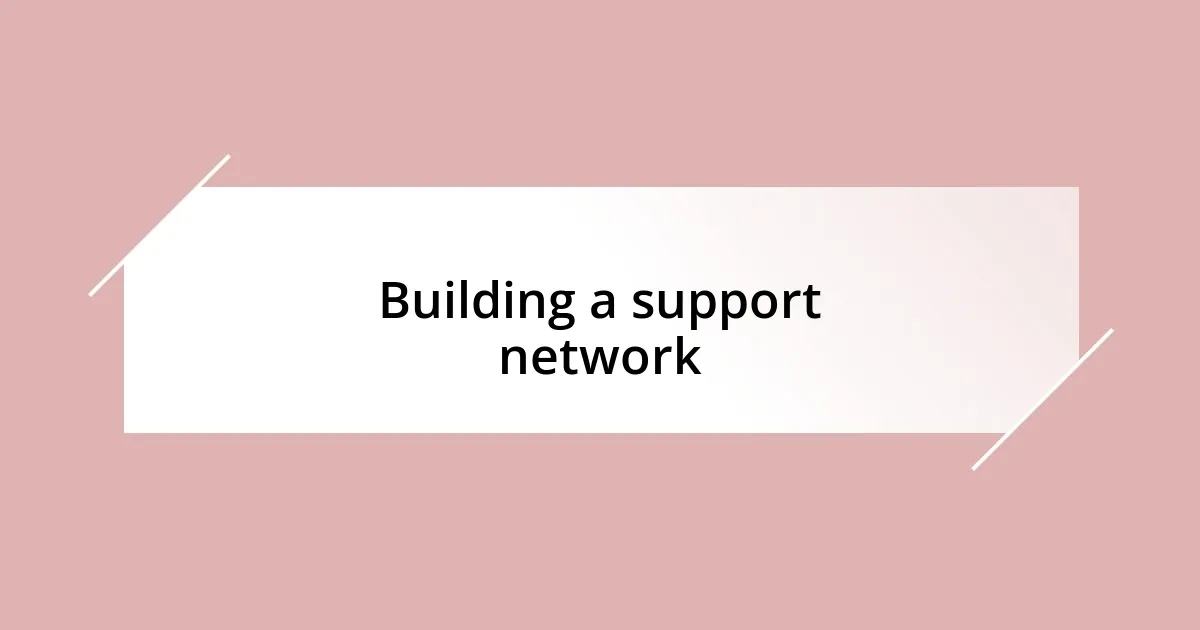
Building a support network
Building a support network is a journey that often begins with simple connections. I vividly recall a time when I felt adrift after losing my job. A casual coffee catch-up with an old colleague turned into an unexpected lifeline. Sharing my worries not only made me feel heard but also revealed how many of us share similar struggles. Have you ever realized that just reaching out could uncover a wealth of shared experiences?
As I expanded my network, I discovered the power of diverse relationships. Joining online forums and local meetups opened doors to incredible people who were more than willing to share their insights. I still remember the warmth of a workshop where strangers transformed into allies, sharing resources and encouragement. Isn’t it uplifting to know that you’re part of a community that genuinely cares about each other’s well-being?
It’s essential to foster these connections intentionally. I’ve learned that actively nurturing relationships—whether through regular check-ins or participating in group activities—creates a solid foundation of support. Think about your own network: who are the people you could turn to when challenges arise? It can be as simple as sending a message or making a phone call. When we invest in our support networks, we not only find solace but also encourage others to do the same.
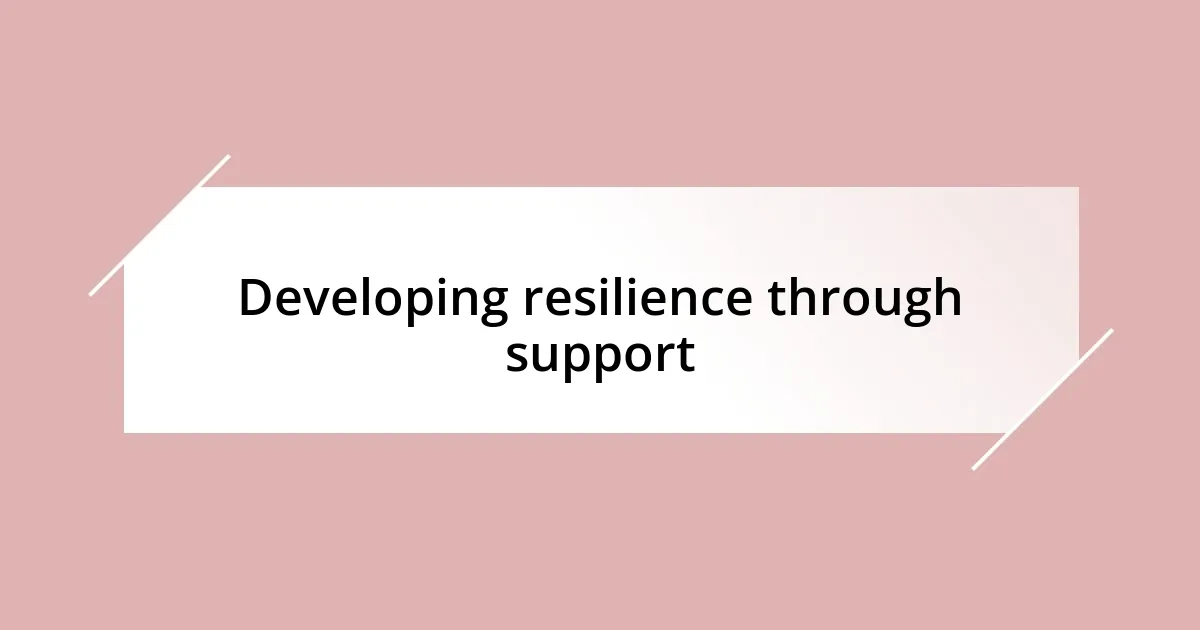
Developing resilience through support
Developing resilience through support is truly a transformative experience. I remember a particularly tough period when I felt overwhelmed by personal challenges. I reached out to a close friend who not only listened but also reminded me of my strengths. This conversation sparked a shift in my mindset—just knowing someone believed in me made a world of difference. Have you ever had a moment where a simple gesture of support changed everything?
Support isn’t just about receiving; it’s also about giving back. I found that when I offered my own encouragement to others, it reinforced my resilience. There was this time when a friend was struggling with a career decision, and my insights helped her gain clarity. Seeing her flourish brought me joy, reminding me that supporting others can be a powerful catalyst for strengthening our own resolve. Doesn’t this cycle of support create a more vibrant community?
Moreover, engaging in group activities can amplify resilience significantly. I began attending weekly meetings with a support group, where sharing experiences fostered a sense of belonging. I found comfort in our collective struggles and triumphs. Each story shared was a thread woven into a fabric of resilience that enveloped us all. It was thrilling to realize that we were all in this together—don’t you feel empowered when surrounded by people who truly understand?
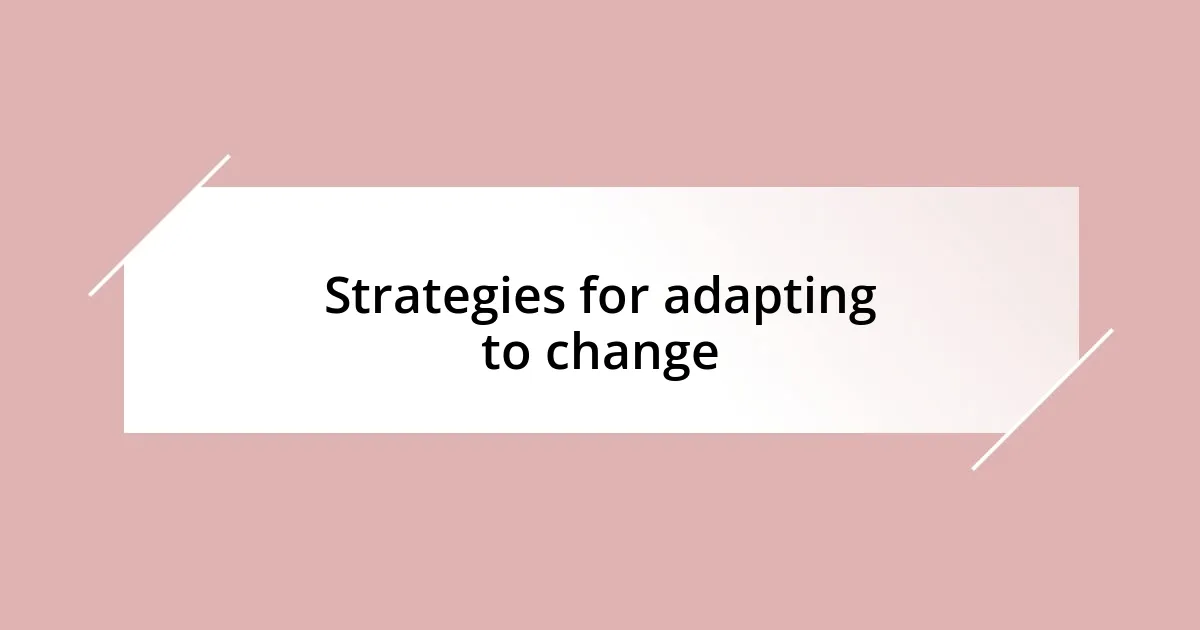
Strategies for adapting to change
Often, my journey through change has been anchored in embracing mindfulness. When faced with uncertainty, I found that taking just a few moments to breathe and reflect helped center my thoughts. This practice allowed me to step back from the chaos and respond rather than react. Have you ever noticed how clearing your mind can create space for clarity when facing challenges?
Another strategy that has proven invaluable is setting small, manageable goals. When I was navigating a major life transition, breaking tasks down into bite-sized pieces made the overwhelming feel achievable. For instance, instead of tackling the entirety of my job search at once, I focused on refining my resume one day and reaching out to a professional contact the next. Isn’t it encouraging to see progress, even in small steps?
Additionally, maintaining an open mindset has played a significant role in my adaptation process. I remember a time when I had to pivot my career direction unexpectedly. Instead of resisting the change, I chose to see it as an opportunity for growth. This shift in perspective not only opened me to new possibilities but also inspired me to explore skills I never considered I’d have. How might your mindset shift if you viewed change as an invitation to evolve?
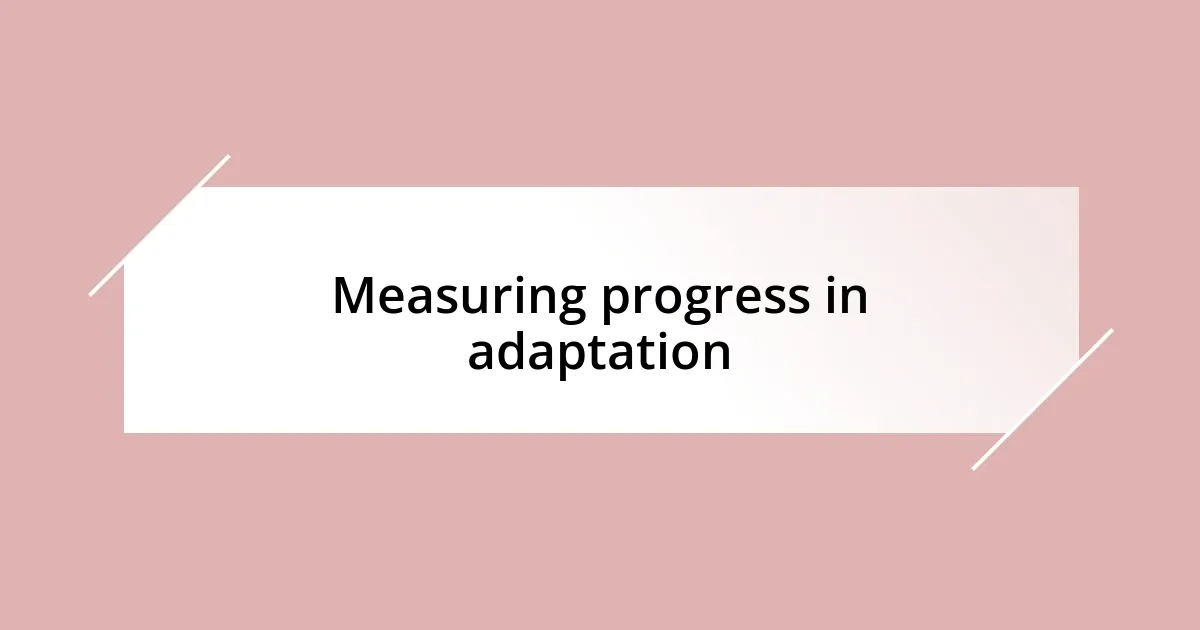
Measuring progress in adaptation
Measuring progress in adaptation can sometimes feel like an abstract concept, but I learned that tracking small victories can make a substantial difference. For example, during one significant shift in my life, I started maintaining a journal where I noted my thoughts and feelings weekly. Reflecting on my entries, I could see how my perspective and emotional responses evolved over time. Have you ever thought about how tangible records, like journaling, could reveal your growth in adapting to change?
Another way I gauged my adaptation was through feedback from those around me. I remember asking trusted friends how they viewed my response to changes in my life. Their insights opened my eyes to strengths I hadn’t recognized in myself. Their encouragement felt like a pat on the back, reminding me that progress isn’t just a solo journey but a shared experience. Isn’t it fascinating how others can help illuminate our path forward?
Lastly, I discovered that measuring progress often involved embracing setbacks as part of the journey. The first time I faced a setback after feeling like I was making progress, I felt disheartened. However, I learned to reframe that moment as a valuable lesson rather than a failure. Tracking these setbacks alongside successes helped me see the larger picture, allowing me to understand that growth isn’t linear—it’s a winding road full of learning opportunities. Have you ever considered how setbacks can actually be signposts guiding you toward deeper resilience?












